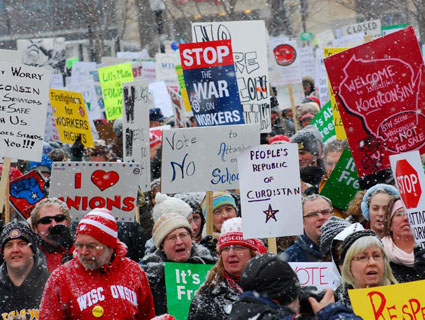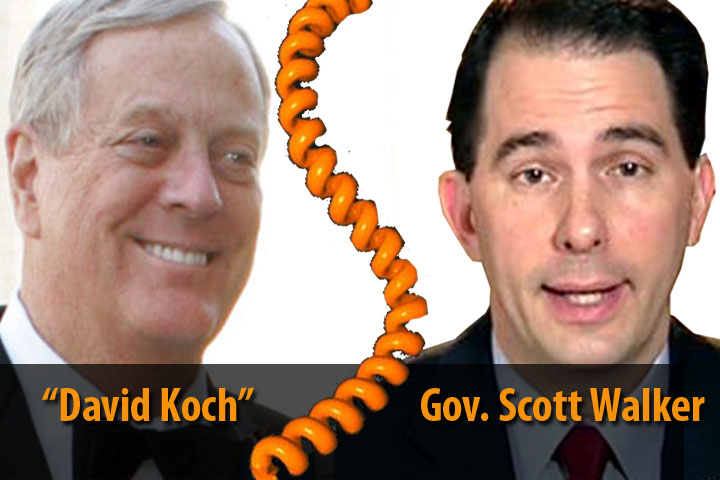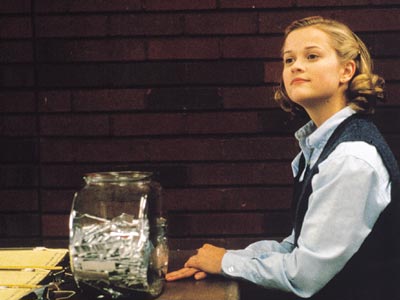
Wisconsin Governor Scott Walker at a press conference on Monday, Feb. 21. Andy Kroll
Did Wisconsin Scott Walker break the law during his phone conversation with a prank caller posing as right-wing billionaire David Koch? At least one campaign finance watchdog, the Public Campaign Action Fund, is exploring whether Walker violated a ban against political coordination in Wisconsin.
Walker believed he was speaking to Koch who—along with his brother, Charles Koch—is among the richest men in the US and major funders of dozens of right-wing groups. The political action committee of Koch Industries, the brothers’ business empire, was a top donor to Walker’s 2010 gubernatorial campaign. In reality, though, Walker was actually speaking with Ian Murphy, a self-described gonzo journalist and editor of the Buffalo Beast. The prank has stirred up a major national controversy, with critics crying foul over Walker’s comments to the faux “David Koch.”
In his conversation, Walker says that GOP lawmakers in “swing areas” will need support for their decision to back Walker’s controversial budget repair bill, which would cut collective bargaining rights for public-sector unions, among other changes. Walker appears to hint that the fake David Koch could be the one to provide that outside support to those swing-district Republicans. Here’s the full exchange:
Gov. Walker: “After this in some of the coming days and weeks ahead, particularly in some of these more swing areas, a lot of these guys are going to need, they don’t need initially ads for them, but they’re going to need a message out. Reinforcing why this was a good thing to do for the economy, a good thing to do for the state. So to the extent that message is out over and over again is certainly a good thing.”
Ian Murphy (pretending to be David Koch): “Right, right. We’ll back you any way we can.”
“If Wisconsin law forbids coordination with political donors similar to federal law, Gov. Scott Walker is not just in political trouble, but in legal hot water,” said David Donnelly, national campaigns director for the Public Campaign Action Fund.
There are several looming questions here. First, can what Walker said actually be considered collaboration? And does the law even apply if the caller is a prankster? Adam Smith, spokesman for the Public Campaign Action Fund, says the group is looking closely at Wisconsin law to answer these questions and take appropriate action, if any at all.
The controversy centers around Walker’s budget bill, which would, among other things, eliminate public-sector unions’ right to collectively bargain and allow the state hold no-bid auctions for state-owned energy assets like power plants. For the past nine days, unions and left-leaning groups have been protesting Walker’s bill, demanding that he allow unions to keep their bargaining rights. Walker, however, has refused to negotiate with labor leaders, saying the bargaining provision is crucial to the state’s future fiscal health.
In addition to donating to Walker’s 2010 campaign, the Koch Industries PAC also gave more than a million dollars to the Republican Governors Association, which in turn spent more than $3 million attacking Walker’s 2010 opponent, Democratic Milwaukee mayor Tom Barrett.
















